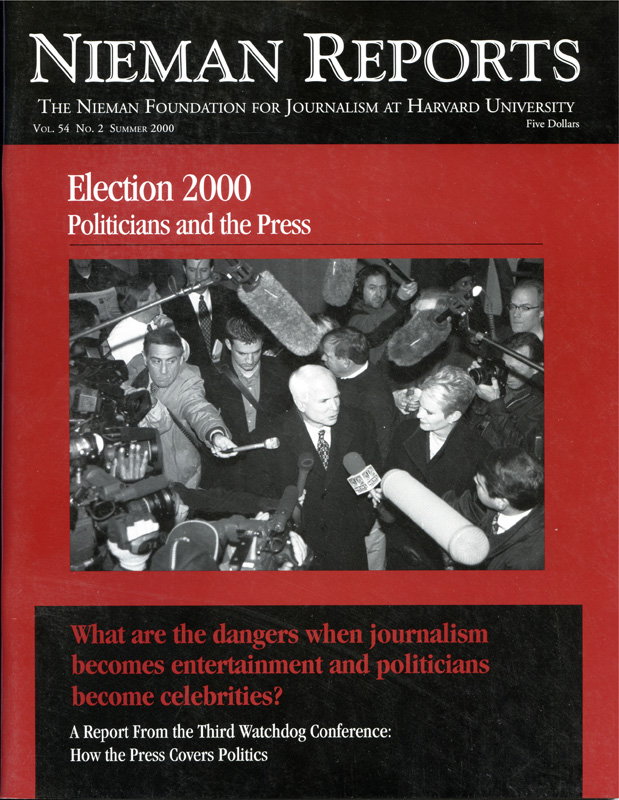Views About the Press
Survey participants were asked, “Is press scrutiny of political campaigns worth it?” A 53-36 percent majority endorsed the press’s watchdog role in election campaigns. As Kohut noted in reporting this finding, “That’s a horrible endorsement of this basic function of the press.” By a similar margin, 59 percent to 34 percent, survey respondents said they think editors care more about the opinions of politicians and other political insiders than their own audiences when deciding which stories to cover in an election.
Reporting on the Personal Lives of Candidates
“The public doesn’t want more exposés of the personal lives of candidates and doesn’t want more inside baseball reporting,” Kohut said. “Unlike tabloid audiences, ordinary people are not anxious to pry into the private lives of politicians. In a highly heterogeneous news market, you can’t judge broad public opinion by what makes the needle move on cable chat shows or their print equivalents.”
For example, interest in campaign news dropped from 53 percent in late July to 46 percent in early September following weeks of reporting about George W. Bush’s possible cocaine use. Decline was sharpest among Republicans who normally follow campaign news more than Democrats or Independents.
The Pew Survey tested 13 hypothetical stories about presidential candidates’ personal lives. Clear majorities held the view that the press should report on four of the possible 13 personal issues or situations:
- Spousal abuse
- Tax cheating
- Exaggerating military record
- Exaggerating academic achievements
The survey revealed similar clarity about what the press should not report:
- Past drinking
- Past drug use or use of antidepressants
- Old affairs
- Abortions
Assessing the Character of Candidates
“Reporting about personal qualities is a very tricky game for the press in most elections and in this one in particular,” Kohut observed. “On the one hand, Americans say they strongly reject press inquiry into most avenues of a candidate’s life. On the other hand, they place pretty high priority, according to our survey, on knowing certain things about a candidate.”
- Fully 82 percent said it’s very important to learn about a candidate’s reputation for honesty.
- Almost as many, 71 percent, said the same about getting a sense of how well the candidate connects with average people.
Most Americans say they are not as interested in other personal characteristics. Among the personal information they say they are not as interested in knowing is:
- A candidate’s church membership
- A candidate’s clubs and associations
- A candidate’s experiences growing up
- What a candidate’s spouse is like
- Military service (except among men over the age of 50)
They claim to be somewhat more interested in learning about:
- Campaign contributors
Reporting on Campaign Issues
“People say they want to hear about issues,” Kohut said, “…but when no big issues dominate the national consciousness and divide the candidates, the default is personal qualities.”
The survey revealed that Americans want journalists to focus on coverage of issues. However, when respondents were given a list of six or seven issues and asked what they want to see the next President focus on, nearly equal percentages chose many different topics. “None of them overshadows others,” Kohut said, pointing to the top three:
- Shoring up Social Security
- Protecting Medicare
- Keeping the economy strong
Significant mention went to:
- Improving the educational system
- The nation’s moral breakdown
- Improving the health care system
Of 11 issues tested, the survey found only two that people had heard a lot about:
- The debate over whether U.S. troops should be used to go into another country to stop the killing of innocent civilians in a civil war (This was because of Kosovo.)
- Health insurance for the uninsured (This was because several weeks prior to the poll Bill Bradley had unveiled his health care proposal.)
When asked, “Which of these issues do you talk about with your friends and family,” other issues rose to the surface aside from the use of force and the medically uninsured:
- How to fix Medicare and whether premiums or age eligibility should be increased
- Whether to put a portion of Social Security funds into the stock market
- How to make the workplace more flexible for parents
- How to reduce the gap between rich and poor generally and with regard to school districts in particular
Issues provoking less discussion and having less resonance were ones which people described as having “more interest to Washington elites than ordinary people”:
- Whether the United States has more of a responsibility than less developed countries to deal with global pollution
- Whether to ban soft money contributions to political parties
- How to reform the international financial system to make it more stable
- How to ensure Internet access for the poor
“Can these issues and others change what appears to be a campaign headed in the direction of a focus on candidates and their personal qualities? I think the answer is maybe,” said Kohut. “There’s at least some hope that if the campaigns or if the media stress issues, then the public will follow. But it’s an environment in which issues will have to be brought to the public. They’re not going to come from the bottom up, with regard to national issues at least.”



